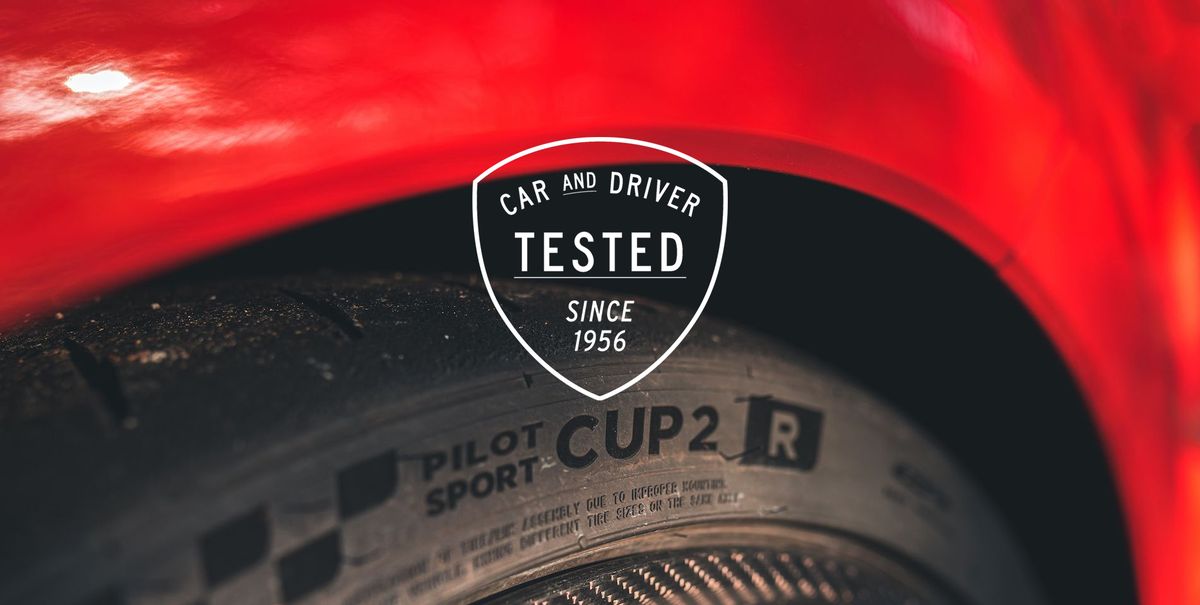Maximizing Chevrolet Corvette Z06/Z07 Track Pack Cornering: Here's the Secret Sauce

Most days, when the weather cooperates, you can find members of our testing team at one or another of our test facilities running all manner of vehicles through our extensive test regimen. One of the tests that we subject almost all vehicles to is skidpad cornering performance, which ascertains maximum lateral acceleration—the maximum steady state cornering gs that a vehicle can attain, an average of an entire lap while turning both left and right. Our testers do hundreds of skidpad tests each year, they’re experts at it, and they virtually always match or exceed any claims provided to us by manufacturers about how hard their vehicles will corner. Which is why we were puzzled when we couldn’t come close to the Corvette engineering group’s max-lat claims for the Z06 with the Z07 track package, which includes the latest gummy Michelin Pilot Sport Cup 2 R ZP tires.
Marc Urbano|Car and Driver
The Corvette engineers told us that the new Z07-equipped Z06 would hold on to the tarmac up to 1.22 g on a 300-foot-diameter skidpad like we typically use, and we had no reason to doubt their number as they are, like us, meticulous testers. But we only saw 1.16 g—a significant difference and well below the company’s estimate. It was an even worse cornering number than we measured on the previous-generation front-engine C7 Z06/Z07, which hung on for 1.19 g. What’s more, we’d just also run a 2023 Z06 convertible without the Z07 package on the skidpad, and its Michelin Pilot Sport 4S ZP tires had hung on up to 1.12 g, a big improvement over the base C8 Stingray’s 1.03-g performance, one you can feel in your neck muscles. What was going on here?
Only after the Z07 Vette left our possession did Chevy tell us the secret sauce that unlocks its full cornering capability. For all of our performance testing, which includes skidpad runs, we adjust tire pressure according to the manufacturer’s recommendations that are printed on the placard located on the door jamb or B-pillar, or in the owner’s manual. If there are multiple choices, we’ll use the high-speed, low-load specification. Oddly, the Z07’s placard required the Cup 2s to be set at 35 psi cold, some 5 psi higher than the base Z06’s tire pressure. Since the tires on the two versions of the Z06 are the same size, we wondered if something was off.
That had us digging deep into the Z06 owner’s manual where we discovered a well-hidden suggestion: owners should lower the Cup 2 R’s tire pressure all the way down to 24 psi cod for maximum cornering on the track. Huh? It took discussions with both the Corvette engineers and engineers from tire-maker Michelin to fully explain the situation.
The reason the Cup 2 tires are supposed to be run on the street at 35 psi instead of the base tires’ 30 psi has nothing to do with handling, ride, or fuel economy but rather wet-weather traction. The Cup 2s have so little tread depth—the outboard half of their tread is essentially slick, like a full-on racing tire—that they have trouble shedding water. Pumping the tire up that extra 5 psi crowns the tread enough to make a significant improvement in their grip when the road is wet according to the Vette engineers.
But it turns out that, counterintuitively, these newest Cup 2 Rs deliver maximum dry road grip at the lower 24-psi pressure. These Cup 2 Rs are the latest iteration of Michelin’s hottest street-legal track rubber. The Michelin man on site at the Z06 track event showed us a cutaway Cup 2R carcass, which revealed a recent discovery by the company. Previously, the radial belts that undergird the tread rubber were laid-on flat and straight across from one of the tires’ shoulders to the other. But Michelin discovered that putting a slight wave into the belts acts like the corrugations in cardboard, stiffening the tire’s tread area that contacts the road and keeping it flatter in cornering. That change and some revisions to the tread compound not only enables the tire to potentially provide slightly more grip, but also deliver dramatically different performance over the course of a track session. The grip of previous Cup 2s was well known for dropping off from its lofty peak after only a couple of laps; these new ones are said to be able to maintain their grip, and hence constant lap times, through session after session.
We will no doubt appreciate that capability when we run the Z06 with the latest Cup 2 Rs at our annual Lightning Lap event. But we wish we had been tipped off about the inflation-pressure information hidden in the Z06’s owner’s manual so that we could have delivered representative cornering test results for the Z07 track-pack model. After all, cornering grip numbers are not only important on the track; they’re a proof point for ultra-high-performance carmakers and enthusiasts alike.
We’ll just have to get another Z07 back in the office as soon as possible to rerun our skidpad test. We could think of much worse ways to spend an afternoon.
This content is imported from OpenWeb. You may be able to find the same content in another format, or you may be able to find more information, at their web site.



